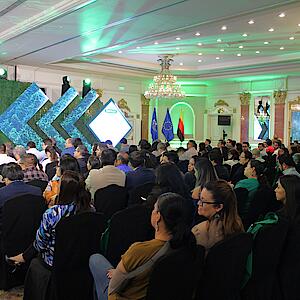CABEI facilitates access to higher education for young Central Americans
CABEI’s Educational Credit Program is aimed at promoting access to education in order to increase Central America’s economic development and integration.
In order to help facilitate access to higher education financing for thousands of young Central Americans to increase their employability, the Central American Bank for Economic Integration (CABEI) signed an educational credit agreement with the Central American Institute of Business Administration (INCAE) at its Francisco de Sola Campus in Nicaragua.
CABEI's Educational Credit Program is open to all Central American universities, which must go through the Bank's eligibility process in order to be approved to access the resources. At present, this important CABEI program has US$20 million available to support the region's young people to pursue their educational dreams. The Educational Credit Program was created to increase the educational levels of the Central American countries and is financed with the Bank's own funds and contributions from Taiwan's International Cooperation and Development Fund (ICDF).
During the signing event, CABEI Director for Nicaragua Dr. Silvio Conrado explained that this strategic alliance is part of the Bank's efforts to promote high impact initiatives in the region with the ultimate goal of fostering the development of the Central American countries. He added that the agreement in Nicaragua strengthens CABEI's efforts to provide educational financing for the citizens of the Isthmus.
CABEI invites young Central Americans to visit the universities already affiliated with the Educational Credit Program, which include Universidad Americana, Ave María College, Universidad Thomas More, Universidad de Managua and Universidad Centroamericana, to learn about their educational programs and entrance requirements.
INCAE is a private, non-profit, multinational institution of higher education founded in 1964 as an initiative of the Central American business community and governments. It is dedicated to teaching and research with a global perspective in the fields of administration and economics to train individuals capable of successfully occupying top management positions in Latin America. Currently, INCAE has two campuses, the Francisco de Sola Campus in Managua, Nicaragua and the Walter Kissling Gam Campus in Alajuela, Costa Rica.
At present, INCAE has about 364 students enrolled in different academic programs, and it has graduated a total of 1,079 professionals over the past seven years.


![[Translate to English:] [Translate to English:]](/fileadmin/_processed_/e/3/csm_WhatsApp_Image_2024-04-18_at_2.12.23_PM__2__590ef43ade.jpeg)
